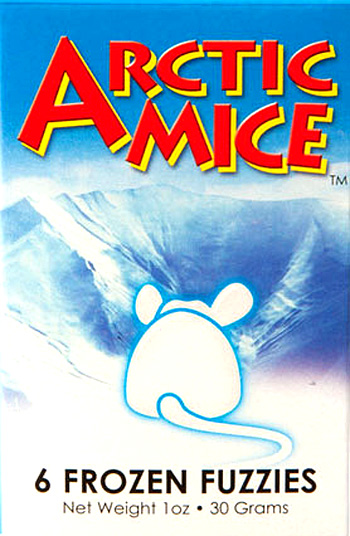Frozen Mice Sold By Florida Company Make Dozens Sick
By Space Coast Daily // May 22, 2014
illnesses associated with feeder rodents
U.S. Food and Drug Administration Investigates Outbreak of Human Salmonella Typhimurium Infections Linked to Frozen Feeder Rodents Packaged by Reptile Industries Inc.
More than three dozen people in 18 states have been struck by salmonella after handling frozen rodents traced back to a Florida company. Five of the patients were hospitalized. The U.S. Food and Drug Administration, along with the Centers for Disease Control and Prevention (CDC) and state and local officials, have been investigating illnesses associated with feeder rodents packaged by Reptile Industries Inc. of Naples, Fla.
What is the Problem and What is Being Done About It?
The U.S. Food and Drug Administration is warning consumers who may have purchased Reptile Industry Inc.’s Arctic Mice brand frozen rodents from PetSmart since January 11, 2014, that this product, which is used as reptile and amphibian food, has the potential to be contaminated with Salmonella.

This brand of feeder rodents is packaged by Reptile Industries Inc. of Naples Fla., and sold at PetSmart stores nationwide. Reptile Industries Inc. has declined to recall all of the suspect product at this time.
Reptile Industry Inc.’s Arctic Mice brand frozen rodents purchased from PetSmart have been linked to an outbreak of Salmonella Typhimurium illnesses in people. Feeder rodents, as well as the reptiles and amphibians they are fed to, can be sources of Salmonella infection for people. The FDA, the Centers for Disease Control and Prevention (CDC), and state and local officials have been investigating the outbreak.
As of May 13, 2014, the CDC reports that there have been 37 Salmonella Typhimurium illnesses in this outbreak since January 11, 2014. Cases have been reported from the following states: Alabama (1), Arizona (2), California (7), Illinois (1), Kentucky (1), Maryland (1), Michigan (2), Minnesota (1), Missouri (2), Montana (3), New Jersey (3), New Mexico (1), North Carolina (1), Ohio (4), Oregon (2), Pennsylvania (3), South Dakota (1), and Texas (1). Five hospitalizations have been reported during this outbreak.
In interviews, ill persons answered questions about foods eaten and animal contact during the week before becoming ill. Twenty-one (66%) of 32 ill persons interviewed reported contact with multiple types of reptiles, including snakes and lizards. Seventeen of the 21 ill persons reporting reptile exposure were able to provide information about what the reptile was fed. Fifteen (88%) of these 17 ill persons reported exposure to frozen feeder rodents.
Testing of two frozen feeder rodent samples collected during the investigation by the FDA from Reptile Industries revealed the presence of the outbreak strain of Salmonella.
Additionally, testing conducted by the Oregon State Public Health Laboratory isolated the outbreak strain ofSalmonella Typhimurium in one sample of unused frozen mice, packaged by Reptile Industries, Inc., taken from an ill person’s home in Oregon.
What are the Symptoms of Salmonella infection?
Most people infected with Salmonella develop diarrhea, fever, and abdominal cramps. The illness usually lasts 4 to 7 days, and most people recover without treatment.
How Soon do Symptoms Appear After Exposure?
Most people infected with Salmonella develop diarrhea, fever, and abdominal cramps 12 to 72 hours after infection.
What are the Complications of Salmonella Infections?
In some people, the diarrhea may be so severe that the person needs to be hospitalized. In these people, theSalmonella infection may spread from the intestines to the blood stream, and then to other body sites and can cause death unless the person is treated promptly with antibiotics.
Children are the most likely to get salmonellosis. The rate of diagnosed infections in children less than five years old is higher than the rate in all other persons. Young children, the elderly, and those with compromised immune systems are the most likely to have severe infections. It is estimated that approximately 400 persons die each year with acute salmonellosis.
Consumers who have Reptile Industries Inc.’s Arctic Mice brand frozen rodents purchased from PetSmart since January 11, 2014, should dispose of the product by placing it in a sealed container in the trash so that no children, pets, or other animals, such as wildlife, may be able to reach it.
Additionally, consumers who handle feeder rodents should follow these tips to reduce the risk of Salmonellainfection:
- DO thoroughly wash your hands with soap and water (for at least 20 seconds) immediately after handling feeder rodents or anything in the area where they are stored, thawed, prepared, and fed to reptiles or amphibians.
- DO thoroughly clean and disinfect all surfaces that come in contact with feeder rodents. A bleach solution of 1 tablespoon bleach to 1 quart (4 cups) water is an effective disinfectant. For a larger supply of solution, add ¼ cup bleach to 1 gallon (16 cups) water.
- DO keep feeder rodents out of areas where food and drinks for people are stored, prepared, served, or eaten.
- DON’T thaw frozen feeder rodents in a microwave oven used for human food.
- DON’T prepare feeder rodents or feed them to your pet reptile or amphibian with kitchen utensils that you use to prepare human food.
- DO designate separate kitchen utensils used solely for these purposes and clean and disinfect them after each use.
- DON’T let children (especially those younger than 5 years), the elderly, and people with weakened immune systems handle or touch feeder rodents, reptiles, or amphibians.
Contact your healthcare provider if you have any of the symptoms described above.
The FDA encourages consumers with questions about food safety to call 1-888-SAFEFOOD Monday through Friday between 10 a.m. and 4 p.m. Eastern time, or to consult the fda.gov website: www.fda.gov.











